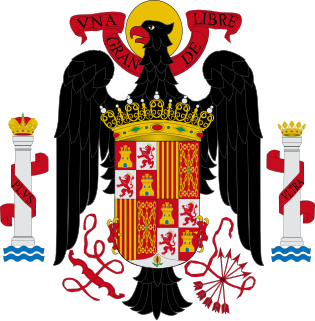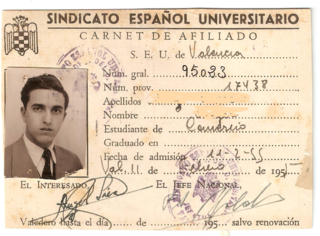 W
WThe Falange Española Tradicionalista y de las Juntas de Ofensiva Nacional Sindicalista was the sole legal party of the Francoist regime in Spain. It was created by General Francisco Franco in 1937 as merger of the monarchist neoabsolutist, ultracatholic Carlist Traditionalist Communion with the Fascist Falange Española de las JONS. Besides the resemblance of names, the party formally retained most of the platform of FE de las JONS and a similar inner structure. In force until April 1977, it was rebranded as Movimiento Nacional in 1958.
 W
WThe Falange Española de las Juntas de Ofensiva Nacional Sindicalista, was a fascist political party founded in 1934 as merger of the Falange Española and the Juntas de Ofensiva Nacional-Sindicalista. The Falange Española de las JONS, which became the main Fascist group during the Second Spanish Republic, ceased to exist as such when, during the Civil War, General Francisco Franco merged it with the Traditionalist Communion in April 1937 to form the similarly named Falange Española Tradicionalista y de las JONS, which became the sole legal party in Spain until its dissolution in 1977.
 W
WFrancoist Spain, which was officially known as the Spanish State and in Spain as the Francoist dictatorship, is the period of Spanish history between 1936 and 1975, when Francisco Franco ruled Spain with the title Caudillo.
 W
WFor all intents and purposes, the history of contemporary Spain began with the death of caudillo Francisco Franco on 20 November 1975, the accession of King Juan Carlos I to the throne and the establishment of the parliamentary monarchy. In 1978, the current Spanish Constitution of 1978 was signed and the status of Spain's autonomous entities (autonomías) was defined.
 W
WThe mottos of Francoism are mottos which encapsulate the ideals of Francoist Spain. Although the regime had many ideological influences, it employed Falangism in its popular movements. Falangist ideology was easily incorporated in the creation of mottos as it is believed to demonstrate a certain reluctance towards political agendas, and to favour empiricism, taking action, and the simplification of ideas.
 W
WThe Movimiento Nacional was the name given to a governing institution established by General Francisco Franco during the Spanish Civil war in 1937. During Francoist rule in Spain, it purported to be the only channel of participation in Spanish public life. It responded to a doctrine of corporatism in which only so-called "natural entities" could express themselves: families, municipalities and unions. It was abolished in 1977.
 W
WThe Pact of Madrid, signed on 23 September 1953 by Francoist Spain and the United States, was a significant effort to break the international isolation of Spain after World War II, together with the Concordat of 1953. This development came at a time when other victorious Allies of World War II and much of the rest of the world remained hostile to a fascist regime sympathetic to the cause of the Axis powers and established with the Axis assistance. The 1953 accord took the form of three separate executive agreements that pledged the United States to furnish economic and military aid to Spain. The United States, in turn, was to be permitted to construct and to utilize air and naval bases on Spanish territory.
 W
WPistolerismo refers to the practice used by Spanish employers during King Alfonso XIII's reconstruction crisis of hiring thugs to face syndicalists and notable workers – and vice versa. The workers replied in turn by hiring their own gunmen. In the end, pistolerismo caused the death of 200 workers and 20 employers' gunmen.
 W
WThe Sección Femenina was the women's branch of the Falange political movement in Spain. Founded in July 1934 as part of the Sindicato Español Universitario (SEU) of the Falange Española de las JONS, and fully incorporated to FE de las JONS later in the year, it remained as part of the FET y de las JONS following the 1937 Unification Decree, subsequently becoming an official institution of the single-party of the Francoist dictatorship. Following General Franco's death and the beginning of the transition to democracy it was disbanded on 1 April 1977 together with all Movimiento Nacional institutions. Sección Femenina was led throughout its history by Pilar Primo de Rivera, the younger sister of Falange Española founder José Antonio Primo de Rivera.
 W
WThe Sindicato Español Universitario was a corporatist students' union in Spain, created in the 1930s during the Second Spanish Republic, by the Falange Española under the leadership of José Antonio Primo de Rivera. The SEU was inspired by students' unions linked to contemporary fascist parties of Italy and Romania.
 W
WDuring World War II the Spanish State under Francisco Franco espoused neutrality as its official wartime policy. This neutrality wavered at times and "strict neutrality" gave way to "non-belligerence" after the Fall of France in June 1940. Franco wrote to Adolf Hitler offering to join the war on 19 June 1940. Later the same year Franco met with Hitler in Hendaye to discuss Spain's possible accession to the Axis Powers. The meeting went nowhere, but Franco would help the Axis — whose members Italy and Germany had supported him during the Spanish Civil War — in various ways.
 W
WThe Spanish Patriotic Union was the political party created from above by Spanish dictator Miguel Primo de Rivera, conceived as a support to his conservative dictatorship and integrating political Catholicism, technocrats, and the business-owning classes. The party's power was dependent upon the power of its founder and leader, not any popular mandate. Following the dismissal of Miguel Primo de Rivera in January 1930 by King Alfonso XIII, the party was succeeded by the Unión Monárquica Nacional.
 W
WUnited Nations Security Council Resolution 4, adopted on April 29, 1946, condemned the Francoist State in Spain and formed a sub-committee to decide whether or not his rule was leading to international friction, and if so, what to do about it.
 W
WUnited Nations Security Council Resolution 7, adopted on June 26, 1946, concerned the impact of Spain's dictatorship on international peace and security. The Second World War had ended the year before.
 W
WUnited Nations Security Council Resolution 10, adopted on November 4, 1946, determined that the Francoist State in Spain no longer warranted the continuous observation of the Council and turned over all related documents to the General Assembly. It was adopted unanimously.
 W
WYouth Front was a Spanish political youth organization and far-right militant group, sometimes considered a terrorist organization.